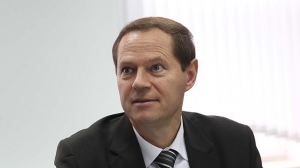Belarus spends about Br4bn every year to buy equipment to train nuclear industry specialists

About Br4 billion is allocated in Belarus every year to buy equipment to train nuclear industry specialists, BelTA learned from Nikolai Maruda, a consultant of the Higher Education Office of the Belarusian Education Ministry, on 27 October.
According to the source, since 2009 about Br4 billion has been allocated on an annual basis to buy new equipment. Persistent efforts are channeled into creating the physical infrastructure and labs to train nuclear industry professionals. Apart from the equipment itself textbooks are being worked out for laboratory-based work.
According to the specialist, at present Belarus has at least half of the training simulators and other technical solutions commonly used by leading foreign education institutions to train nuclear industry specialists. Work is in progress to gradually acquire the rest of the equipment.
Alexander Trifonov, Deputy Director General for Science of the United Energy and Nuclear Research Institute Sosny of the National Academy of Sciences of Belarus, noted that training executive personnel for the nuclear power plant is as important as training nuclear industry specialists. With this in mind the National Academy of Sciences of Belarus has installed large-scale simulators and all kinds of training consoles for practice. Nuclear power plant operators are trained like that among other professions. “A person, who worked, let's say, as a shift foreman in the past, can go through the training process to acquire the necessary experience and master new skills,” said Alexander Trifonov.
Nikolai Maruda pointed out that personnel training for the Belarusian nuclear energy industry proceeds in an effective manner, with the training pace matching the construction pace of the Belarusian nuclear power plant. Six main specializations are taught in the Belarusian State University, the Belarusian National Technical University, the Belarusian State University of Informatics and Radioelectronics, and the A.D. Sakharov International Environmental Institute of the Belarusian State University.













